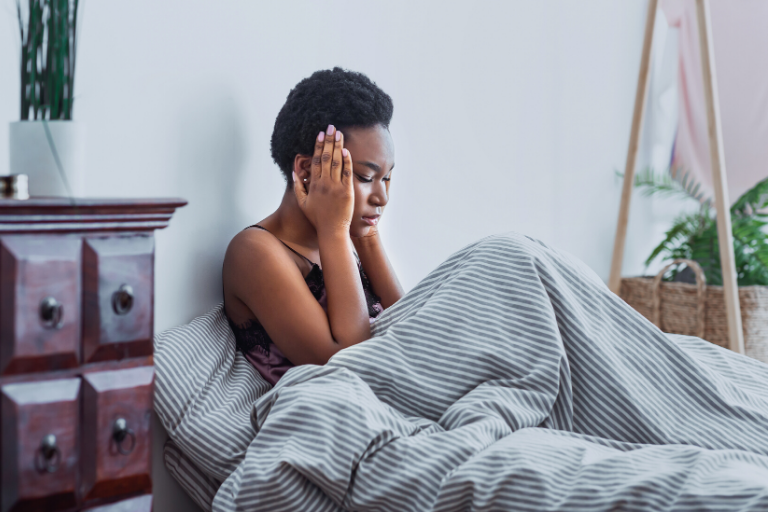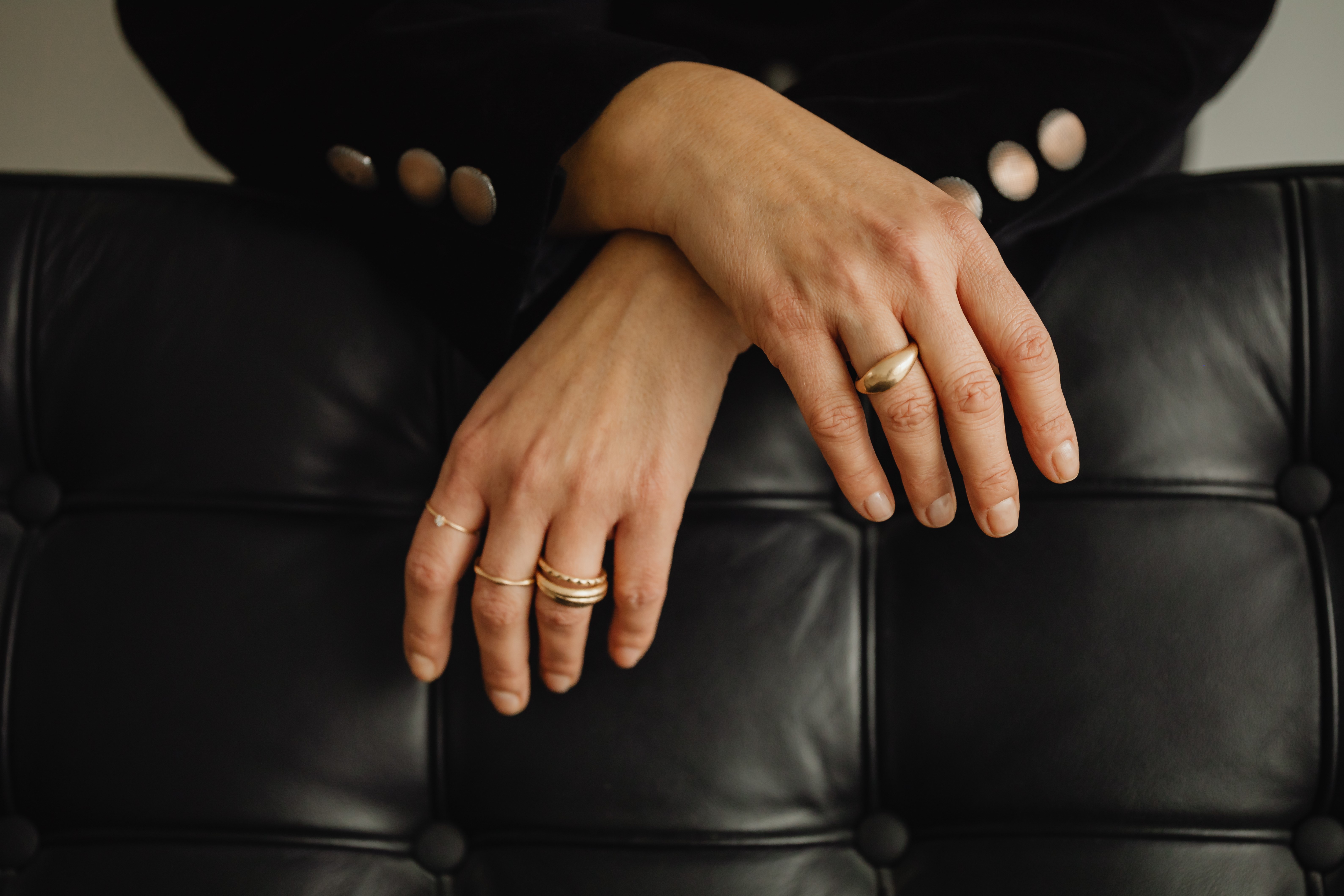What to Do if You Have a Panic Attack While Sleeping
Panic attacks can occur suddently at night and cause overwhelming anxiety. Here's what to do if you have a panic attack while sleeping...

If you experience a panic attack while sleeping, it can lead to a sudden onset of fear and anxiety. Nocturnal panic attacks can occur for no obvious reason, and once your sleep is disrupted it could cause you to lay there in dread, wondering what to do.
Let’s discuss why panic attacks happen at night and what you can do if you find yourself in such a situation.
What Exactly are Nocturnal Panic Attacks?
A nocturnal panic attack refers to when an individual wakes from sleep in a state of panic. As this journal article explains, it is not the same as nighttime arousal that is caused by nightmares or environmental stimuli such as an unexpected noise.
When a panic attack occurs during sleep, it often leads to nervousness and symptoms such as sweating, heart palpitations, chest pain, and a fear of losing control.
What Causes Panic Attacks While Sleeping?
Though a precise reason why panic attacks occur at night hasn’t yet been found, research shows that the brain remains active during sleep. Therefore it’s possible for worries and anxieties of the day to show up at night. If fact, anxiety at night can feel even more severe than in the daytime because nighttime is usually when we find ourselves alone with our thoughts.
When the lights are out, the world is quiet, and there are no more distractions to be found is usually when an entire day’s worth of thoughts come into your mind.
People who have nocturnal panic attacks also tend to have panic attacks during the day. Although scientists are not sure what causes panic attacks, it is evident that underlying factors including genetics, stress, and exposure can lead to panic attacks.
If you have a family member with a history of panic attacks or panic disorder, you might be more likely to experience panic attacks. Hormonal changes or changes from medications may also impact the way your brain functions, causing panic attacks. Feeling stressed, overwhelmed, or highly anxious due to tension in your professional or personal life can also make you more likely to have a panic attack.
Panic Attacks are Night - More Common Than Many Realize
Nocturnal panic attacks are not a subject that is discussed widely, so many feel disheartened and worried when they experience a panic attack while sleeping. However, studies show that the majority of people with panic disorder experience nocturnal panic attacks.
Experiencing a panic attack a night could be both upsetting and confusing, because it’s an experience that combines the fear of a daytime panic attack with the reality that at night you’re barely awake enough to process what’s happening.
Moreover, people who experience a panic attack while sleeping may feel even more vulnerable because it’s dark and the middle of the night.
What Stage of Sleep Do Panic Attacks Occur?
Nocturnal panic attacks usually occur during late stage 2 to early stage 3 sleep. This period is characterized by nom-REM sleep, where your heartbeat and breathing slow and your muscles become relaxed.
Can You Wake Up in a Panic Attack?
The concept of ‘having a panic attack while sleeping’ is somewhat misleading in the sense that it’s very difficult to sleep during the course of a panic attack. It’s the panic attack that usually wakes you up, causing fear and disorientation.
While panic attacks at night usually only last for a few minutes, it may take a while for you to calm down and go back to sleep, since the fear of another panic attack can lead to insomnia.
This post may contain affiliate links. Please read my disclosure for more information.
What To Do if You Have a Panic Attack While Sleeping
You can deal with a panic attack at night by following a series of steps to calm you down. Try to slow down and breathe deeply. Relax your muscles.
Don’t try and fight the panic attack because that will only make you flustered and more anxious. Remember that the panic attack is only temporary and it will fade eventually. Allow it to come and go.
If you’ve been awakened by a nocturnal panic attack, it’s pretty unlikely that you’ll be able to fall back asleep immediately. Therefore, if you experience a panic attack while sleeping, try to get up and do something.
Fully wake yourself. Go the bathroom and splash some water on your face. Next, get a chilled glass of water and sip it slowly. You could also keep ice packets ready to go in your freezer ahead of time. If you experience a panic attack, take out an ice packet and apply it to your back or neck.
To take your mind off the panic attack, try doing something relaxing such as light exercises and stretches, reading a book you enjoy, or listening to calm and gentle music. These activities can provide immediate relief when you experience a panic attack while sleeping.
However, what will really help you long-term is getting to the root of the panic attack, and essentially working with it. After all, if you are awakened by a panic attack, it’s possible that you could try too hard to distract yourself and then get into a struggle with your thoughts.
The most effective solution in dealing with panic attacks involves teaching yourself to accept and observe the panic attack rather than resisting and ignoring it.
To help with this, I recommend that you download the free Rapid Relief from Anxiety audio by Panic Away to help you during a panic attack. You can take this audio with you wherever you tend to get anxious, be it driving, flying, shopping, etc. You can also play it at night to stop a panic attack and calm your thought processes so you can get back to sleep.
Barry Mcdonagh, the creator of the Panic Away audio, suffered from panic attacks for years, but learned to stop his panic attacks by eliminating the ‘fear of a panic attack’ that is often the most overwhelming issue. It is this dread of a panic attack that aggravates the problem and keeps you awake at night. By addressing that ‘fear of fear’ you are able to end a panic attack.
Sleep Anxiety Caused by Panic Attacks
The fear of having another panic attack can often lead to sleep anxiety. This could lead to sleep loss, increased stress and higher risk for more panic attacks. How could sleep anxiety develop? Well, insomnia from a panic attack can fuel a cycle of anxious that makes you dread going back to bed.
For example, Sarah may have a panic attack where she wakes up with fear of losing her job. She might try to go to bed but end up being restless for an hour. She might get up again in the early hours of the morning - her mind racing with nervous thoughts about work.
Anxiety could spread to other areas such as thinking about next day’s events, an appointment she has in a few hours, and even how her day will be terrible if she doesn’t get some sleep. Such an inner dialogue could repeat for multiple nights in a row, causing sleep anxiety and the dread of going to bed in the first place.
If you’re struggling to fall asleep due to anxiety, it could be that treating the anxiety will help you solve your insomnia. Anxiety disorders should only be diagnosed by a licensed therapist or medical professional, so seek out required assistance as needed.
You can also reduce sleep anxiety by shifting your perspective. Try to acknowledge that it’s completely normal to have bad nights of sleep and sometimes it’s unavoidable. When you can tell yourself that you expect it to happen, your body may be more likely to relax and naturally fall into sleep.
How to Prevent Panic Attacks at Night
To prevent nighttime panic attacks from being a persistent problem, it is helpful to create a positive routine around bedtime. You could take a bath in candle light with some relaxing music before going to bed. You might also find it helpful to talk about your worries with a loved one early in the day so they don’t persist at night.
Organization and preparation for the next day can also put your mind at rest when you go to bed. Many people have found making a to-do list helpful, as well as laying out their clothes and preparing their bags for the next day.
It’s also important to make sure you go to bed on time. On average, adults need eight to nine hours of sleep each night to feel rested and refreshed. Going to bed too late and not leaving enough time for sleep can also create sleep anxiety. By giving yourself enough time to get the sleep you need, you can avoid negative thought patterns that fuel anxiety and potentially lead to a panic attack.
To prevent having a panic attack while sleeping, try to limit caffeine, alcohol and sugar before bed. These substances can make you feel jittery and prevent you from getting to sleep.
Also try to avoid using electronic devices close to the time you go to bed. These devices emit light that can be overly stimulating and keep you awake. It may help if you make a rule for yourself to not watch TV, use the computer, or pay bills before going to bed. Read a book, listen to calming music, or meditate instead.
Final Words
Panic attacks at night can be frightening and unsettling, but there are actions you can take to recover afterwards and stop them all together. I’ve created a free guide on 3 Ways to Stop Anxiety and Panic Attacks which you can download below. You can also download the free Rapid Relief from Anxiety audio I mentioned earlier, which is a valuable resource to have around if you suffer from panic attacks.
Thanks for reading! If you liked this content, share with a friend:
Recent Articles
-
7 Best Personal Development Courses to Grow Your Skills and Mindset
Jan 16, 25 04:05 PM
Are you ready to engage in learning and self-improvement? Here's a breakdown of the best personal development courses to level up your life in 2025. -
5 Best Documentary Filmmaking Courses to Bring Your Story to Life
Jan 15, 25 05:12 PM
Love filmmaking? Here are the best online documentary filmmaking courses to help you refine your skills and turn your passion for films into a career. -
What I Wish I Knew About Setting Healthy Boundaries
Jan 10, 25 03:31 PM
Healthy boundaries are the difference between refreshing, life-giving relationships, and toxic, life-sucking ones. Here's what I wish I knew about setting healthy boundaries...



